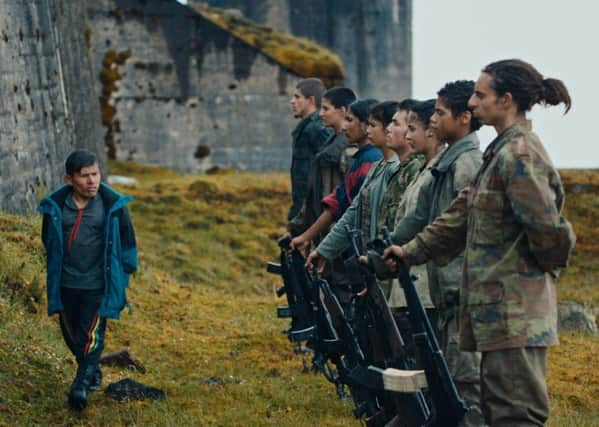Film reviews: Monos | Black and Blue | By the Grace of God | The Beach Bum


Monos (15) ****
Black and Blue (15) **
By the Grace of God (15) ***
The Beach Bum (18) **
A film about child soldiers might immediately conjure images of a well-intentioned, social realist tract designed to condemn a political system that puts firearms in the hands of kids. Monos, however, is not that movie. As directed by Colombian filmmaker Alejandro Landes, it offers a far stranger, richer, more abstract take on the subject, serving up a full-tilt thriller with some of the deranged energy and surreal feel of Apocalypse Now and Full Metal Jacket. Set in an unnamed Latin American country, it embeds us with a group of teenage guerrilla fighters known as the “Monos” or “Monkeys” – a rag-tag group of boys and girls with combat nicknames like Rambo (Sofia Buenaventura), Bigfoot (Moises Arias), Lady (Karen Quintero), Dog (Paul Cubides) and Wolf (Julian Giraldo). In many respects they’re typical hormonally charged teenagers, just ones who spend their days running through boot-camp drills on a misty-mountaintop while guarding a kidnapped white American engineer they call “Doctora” (Julianne Nicholson). With no concept of the wider political fight of which they’re a part, they treat her captivity as a game, largely cut-off from her actual abductors, whose radio communiqués are the only real contact they have with the outside adult world. When even that contact is severed, though, the action shifts more and more into the jungle below, with the kids and their prisoner becoming more primal as the latter makes repeated attempts to secure her own freedom. The film makes stunning use of its locations, their alien quality amplified by another wild, atonal score from Under the Skin’s maverick composer Mica Levi. But it’s the way Landes keeps us off balance, repeatedly shifting point of view so we latch on to the humanity of the characters without ascribing them hero or villain status, that really makes this so enervating and relevant for a world in which the machinations of conflict are never clear-cut.
The on-the-nose title of racially charged cop movie Black and Blue is probably the most subtle thing about this atrociously scripted, ludicrously plotted thriller about a rookie cop (Naomie Harris) forced to fight for her life after witnessing the police execution of a young black drug dealer in her old neighbourhood. Capturing the crime on her regulation body-cam, Harris’s character, Alicia, knows her only chance of survival is to get back to her precinct and turn the footage over to Internal Affairs. But at a time when police brutality and systemic racism is headline news, her uniform automatically makes her a target of both her fellow cops (led by Frank Grillo’s corrupt narc) and the people she grew up with. That’s actually a promising set-up for a slick thriller to explore the complexities of racial identity and law enforcement in the age of Black Lives Matter. Unfortunately, director Deon Taylor and screenwriter Peter A Dowling sabotage what intelligence Harris brings to proceedings by forcing her character to act irrationally at every turn so they can pad the movie out with inconsequential, largely nonsensical action.
Advertisement
Hide AdSince breaking through as a teenager with his hot-button script for Kids, Harmony Korine has challenged the complacency of the indie film scene by infusing his already oddball directorial efforts with an avant garde freak show quality that can make for challenging, but never usually dull, viewing. With The Beach Bum, however, he’s tipped from playful experimentation into freeform tedium. Coming on like a mid-life-crisis-themed companion piece to his outré crime opus Spring Breakers, it stars Mathew McConaughey as a whack-a-doodle poet who lives a blissed-out existence among the vagrants and burnouts of Key West, Florida, safe in the knowledge that his ultra-wealthy wife (Isla Fisher) supports his lifestyle choices because he’s an artistic genius “from another dimension.” When fate conspires to remove this safety net, however, he’s forced to try and finish the great American novel he’s been promising to write if he’s to have any hope of moving once more between the “bottom feeders” and the wealthy elites. To Korine’s credit, he’s really not interested in delivering a moralistic redemption story about a middle-aged screw-up learning to take responsibility; befitting a character who goes by the name of Moondog, the film is more enamoured with painting a cartoonish portrait of an individual coming to the Dude-like realisation that his way of existing in the world suits him just fine. Alas, despite McConaughey’s semi-naked, bongo-playing portrayal of Moondog as a kind of cosmic Charles Bukowski, the film’s goofball energy doesn’t translate into a fun film for the rest of us.
By the Grace of God sees the mercurial François Ozon on deadly serious form with a fact-based drama about a group of men in Lyon reckoning with the sexual abuse they suffered as children at the hands of their local priest. Like the similarly themed Spotlight, it’s a no-frills film about the ease with which the Catholic Church uses its hold over a community to quietly sweep under the carpet crimes no one is even trying to deny. Told from the victims’ perspective, the film zeroes in on three characters – played by Melvil Paupaud, Denis Ménochet and Swann Arlaud – who are in very different situations from each other as adults, but as the criminal investigation is re-opened, Ozon gradually reveals the devastating psychological and emotional toll this betrayal of their childhoods has taken on all of them. It’s a tough subject, but one Ozon handles it with sensitivity and controlled outrage. ■